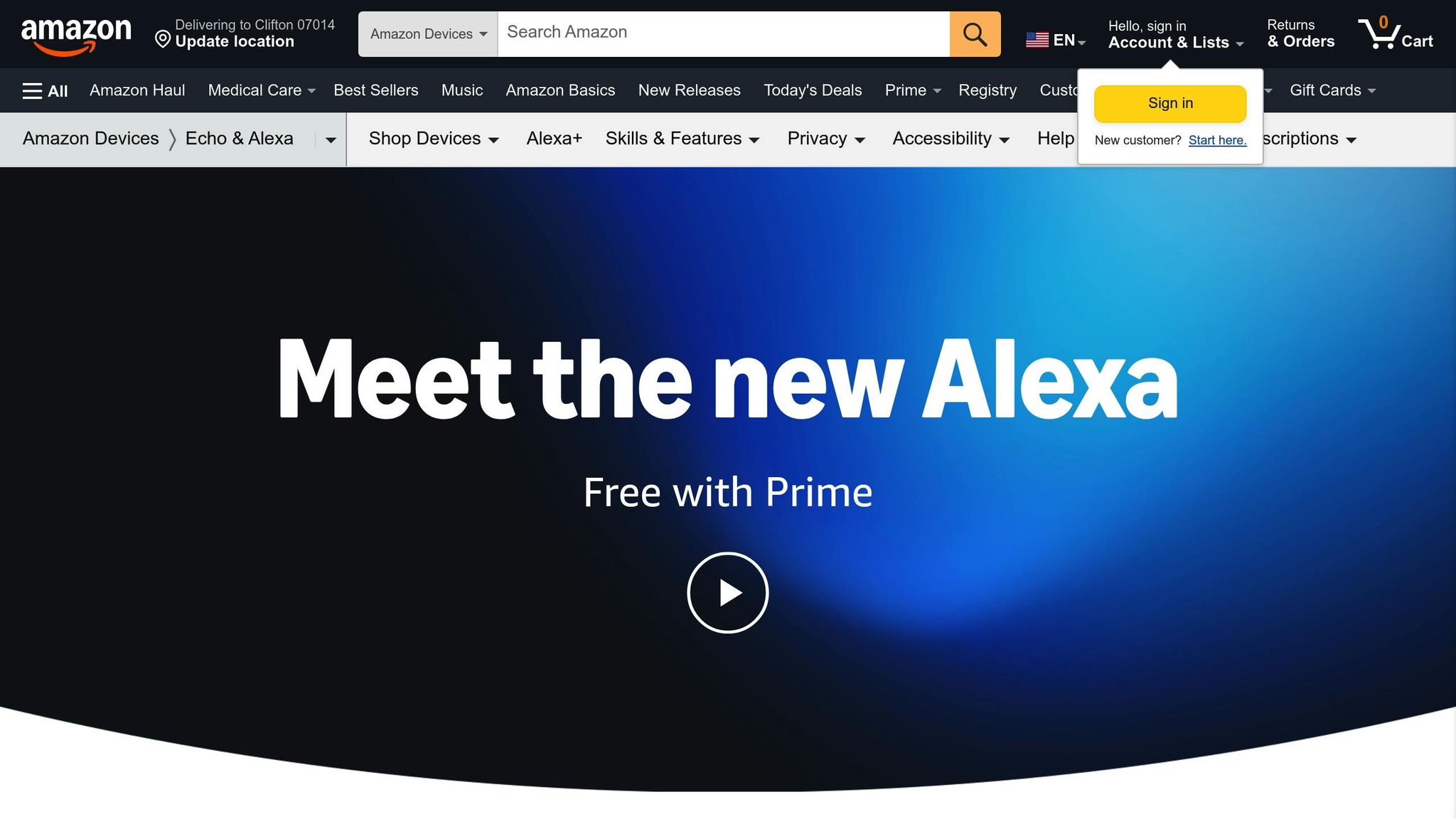
Building a custom app for your smart device can deliver benefits that Alexa simply can’t match. While Alexa offers convenience, its limitations in brand control, advanced features, security, offline functionality, and growth potential make custom apps a better choice for businesses looking to stand out and meet specific needs.
Key Reasons to Choose a Custom App:
- Brand Control: Full ownership of your app’s design, voice, and user experience, unlike Alexa’s restrictive framework.
- Advanced Features: Custom apps can leverage hardware capabilities, augmented reality, and tailored functionalities not possible with Alexa.
- Better Security: Custom apps allow for stronger data protection and compliance with regulations like HIPAA and GDPR.
- Offline Functionality: Operate without internet, ensuring reliability in critical scenarios, unlike Alexa’s internet dependency.
- Unlimited Growth: Quickly roll out updates, integrate new technologies, and avoid Alexa’s platform constraints.
Quick Comparison:
| Feature | Custom Apps | Alexa Integration |
|---|---|---|
| Brand Control | Full customization | Limited by Amazon’s rules |
| Advanced Features | No restrictions | Limited to Alexa’s ecosystem |
| Security | Custom protocols, compliance | Relies on Amazon’s framework |
| Offline Usage | Works without internet | Requires constant connectivity |
| Growth Potential | Unlimited updates, flexibility | Platform-restricted growth |
Custom apps give you the freedom to design unique, secure, and reliable solutions tailored to your business goals. While Alexa is a great starting point, custom apps unlock possibilities that can take your smart device experience to the next level.
Brand Control Limitations in Alexa
Alexa’s Design Restrictions
When developing for Alexa, brands face strict limitations on how they can express their identity. Alexa skills require third-party developers to blend their brand’s identity with Alexa’s built-in persona. This makes it challenging for companies to stand out, as users often can’t distinguish whether they’re interacting with a brand’s skill or Alexa itself.
On the other hand, custom native apps allow brands to break free from these constraints, offering complete creative control.
Custom Apps Offer Full Design Freedom
Custom native apps let brands fully control their design, creating tailored experiences that help retain users and strengthen brand identity.
Banfi highlights the importance of a distinct brand personality:
"In order to create a memorable experience, developers need to surround their skill with a funny, compelling personality. The personality of your skill is like a color for your website. You can’t not pick a color. It is going to be the same for the personality of your skill: Your users will perceive a personality, even if you don’t plan it out or design it properly."
Here’s a comparison of brand control between Alexa skills and custom apps:
| Aspect | Alexa Skills | Custom Apps |
|---|---|---|
| Brand Voice | Blended with Alexa | Fully customizable |
| Visual Identity | Limited options | Complete control |
| User Experience | Standardized | Tailored to brand |
| Flow | Amazon-defined | Brand-defined |
| Integration | Platform restricted | Unlimited possibilities |
These differences in design flexibility play a big role in how users perceive and engage with brands. While Alexa skills must follow Amazon’s framework, custom apps empower businesses to deliver standout, branded experiences in a crowded digital space.
Advanced Features Beyond Alexa
Alexa’s Technical Limits
Alexa’s system comes with certain restrictions that limit how well it can integrate with devices or fully utilize hardware capabilities. These limitations highlight the gap between Alexa’s ecosystem and what custom apps can achieve.
| Feature Category | Alexa’s Limitations | Impact on User Experience |
|---|---|---|
| Visual Elements | Limited display interactions | Reduces interactive potential |
| Device Integration | Restricted hardware compatibility | Limits full use of device capabilities |
| Processing Power | Standardized performance | Struggles with complex computations |
| Custom Hardware | Works only with Amazon-approved devices | Reduces compatibility options |
Custom Apps Unlock New Possibilities
Custom native apps go beyond these restrictions, leveraging advanced technologies to offer enhanced functionalities. A survey from 2022 revealed that 87% of decision-makers were focused on improving productivity, while 77% aimed to explore new business opportunities. A notable example includes developers integrating Apple Vision Pro by replacing third-party voice libraries with native speech recognition tools.
Custom apps provide:
- Enhanced Visual Processing: Features like augmented reality (AR) and 3D scanning.
- Advanced Data Handling: Local processing of large datasets.
- Hardware Access: Direct use of device sensors and unique features.
- Tailored Functionality: Solutions designed for specific business needs.
This level of customization allows businesses to design tools that align perfectly with their goals. Unlike Alexa skills, which are limited by Amazon’s ecosystem, custom apps can connect to a variety of technologies, APIs, and services. This opens the door to advanced features like real-time data analysis, sophisticated interfaces, and cutting-edge visual processing that Alexa simply can’t match.
Better Security and Compliance
Alexa’s Security Risks
When it comes to Alexa skills, security concerns are a major issue for businesses managing sensitive data. A study of 90,194 Alexa skills uncovered several vulnerabilities in the platform’s security framework. These problems are linked to weak vetting processes and inadequate data protection.
| Security Concern | Impact | Statistics |
|---|---|---|
| Privacy Policy Coverage | Limited transparency | Only 24.2% of skills have privacy policies |
| Sensitive Data Disclosure | Incomplete information | 23.3% of skills fail to disclose data types they access |
| Permission Controls | Risk of exploitation | Skills can bypass permission APIs for sensitive data |
| Brand Protection | Impersonation risks | Lacks automated trademark protection |
The findings also revealed that attackers could impersonate well-known brands, increasing the likelihood of phishing attempts. Without automated trademark protection, users face greater exposure to these risks. These gaps emphasize the need for a more focused security strategy.
Custom Apps Meet Security Standards
Custom apps offer a level of control that Alexa’s fixed protocols simply can’t match. With custom solutions, brands can define their own security measures to align with their overall strategy and provide better user protection. Features like end-to-end encryption, secure data storage, and precise access controls are all possible – far beyond what Alexa skills can offer.
These custom solutions also meet compliance requirements like HIPAA and GDPR while offering stronger protection for sensitive data. For example, in healthcare, custom apps outperform HIPAA-eligible Alexa skills, which are limited to specific APIs and U.S.-only distribution. Custom apps allow for more robust security features, making them ideal for managing Protected Health Information (PHI) or other critical data. This approach ensures both compliance and improved functionality.
sbb-itb-7af2948
Working Without Internet
Alexa Needs Internet
Alexa devices require a minimum speed of 0.51 Mbps for streaming. Without an active internet connection, these devices lose most of their functionality.
"Without an internet connection, Alexa can’t understand your commands, and it wouldn’t know how to reply even if it did. That means your Alexa loses almost all of its functionality when disconnected from the internet." – Jeremy Laukkonen, Writer
Some Echo devices, like the Echo Plus (1st & 2nd gen) and Echo Show (2nd gen), provide limited local voice control. They can handle basic tasks like turning lights on or off and checking the time. However, features such as adjusting alarms or managing Bluetooth connections are unavailable without internet access.
| Feature | With Internet | Without Internet |
|---|---|---|
| Voice Commands | Full functionality | Extremely limited |
| Smart Home Control | Complete control | Basic local control |
| Updates & Settings | Full access | No modifications |
| Data Access | Real-time access | No access to cloud data |
These limitations highlight the challenges of relying solely on internet-dependent devices.
Custom Apps Work Offline
Unlike Alexa, which depends on constant connectivity, custom apps are designed to function even without an internet connection. For instance, Brinks Home™ security systems use Z-wave mesh technology to ensure uninterrupted service during Wi-Fi outages, offering reliable performance when it matters most.
Custom apps achieve offline functionality through:
- Local Data Storage: Keeping critical information directly on the device.
- Smart Caching: Preloading essential data for seamless operation.
- Pre-programmed Routines: Enabling core functions to run without connectivity.
In industries like healthcare or industrial control systems, where constant operation is critical, custom apps provide dependable offline performance. By maintaining local control and accessing cached data, they ensure business continuity even in areas with unreliable internet. While Alexa needs a minimum connection speed of 0.51 Mbps, custom apps operate independently, making them a dependable choice for high-stakes scenarios.
Growth and Updates
Alexa Platform Challenges
Amazon’s tight control over Alexa creates obstacles for businesses aiming to grow. With more than 160,000 skills available, many developers struggle with discoverability. Users often find the Alexa skill marketplace confusing and difficult to navigate, which limits engagement with specific skills.
Here’s how these restrictions affect developers:
| Aspect | Alexa Limitations | Impact on Business |
|---|---|---|
| Updates | Amazon controls release timing | Delayed feature rollouts |
| Discovery | Crowded, complex marketplace | Lower user engagement |
| Customization | Limited platform flexibility | Restricted brand expression |
These limitations slow down innovation, pushing businesses to explore alternatives.
Custom Apps Adapt to Your Needs
Custom apps address the challenges of platform restrictions and poor discoverability. A 2022 survey found that 62% of decision-makers aimed to boost revenue through voice assistants.
With custom apps, businesses can:
- Roll out updates instantly, avoiding platform-imposed delays
- Add new features and integrate seamlessly with existing systems, based on real-time feedback
- Use detailed analytics to improve performance and make informed decisions
By maintaining an open and well-documented API, custom apps can quickly adapt to advancements in technology. For example, as voice recognition improves, custom apps can incorporate these updates without waiting for platform-wide changes.
"I think one of the underrated reasons that the iOS and Android app stores are so successful is because Facebook ads are so good" – Max Child, Volley’s cofounder and CEO
This highlights how custom apps can tap into diverse marketing channels and strategies. With full control over their development, businesses can respond quickly to market shifts and user demands, paving the way for steady, long-term growth.
While Alexa’s platform imposes limits, custom apps give businesses the flexibility to evolve and thrive.
my local, AI Voice Assistant (I replaced Alexa!!)
Conclusion: Why Custom Apps Beat Alexa
Looking at Alexa’s limitations, it’s clear why custom apps often come out on top. Choosing to build a custom app for your smart device offers advantages that Alexa simply can’t match. For example, a 2022 study found that 87% of decision-makers prioritized boosting productivity with voice assistants, while 77% were looking for new business opportunities.
Custom apps give businesses full control over the user experience, making it possible to design interactions tailored to specific needs. Here’s a quick comparison of how custom apps stack up against Alexa:
| Aspect | Custom Apps | Alexa Integration |
|---|---|---|
| Brand Control | Full ownership of design and experience | Limited by Amazon’s rules |
| Feature Set | No limits – customized functions possible | Restricted to Alexa’s capabilities |
| Security | Custom protocols and compliance options | Relies on Amazon’s infrastructure |
| Offline Usage | Can work without internet | Requires constant connectivity |
| Growth Potential | Unlimited updates and development | Bound by platform constraints |
Custom apps act as seamless extensions of your products and services, not just standalone tools. They can integrate deeply with business systems using open APIs and modern development frameworks, ensuring they grow alongside your needs and the latest technology.
With unmatched control and adaptability, custom apps are the better choice for creating standout smart device experiences. While Alexa offers convenience, custom apps pave the way for scalable, future-ready solutions.


